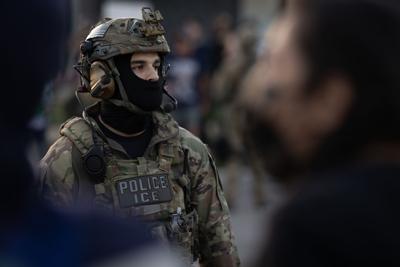
Federal law enforcement agents confront demonstrators protesting outside of an immigrant processing center on September 27, 2025 in Broadview, Illinois. (Photo by Scott Olson/Getty Images)
Arizona community leaders and immigrant rights advocates warned that a recent U.S. Supreme Court decision addressing California immigration enforcement — reminiscent of Arizona’s Senate Bill 1070 — could empower immigration agents to continue making racist enforcement stops across the nation.
The 2010 SB 1070 Arizona law, commonly known as the “show me your papers” law, made it a state crime to be in the country without proper documentation and required law enforcement officials to ask Arizonans about their legal status if they suspected the person was in the country illegally.
While only some local law enforcement agencies cooperated, and only some provisions of the law were upheld in court after a lawsuit, it generated fear among immigrant communities. With its signing, their race or the language they spoke would be reason enough for a local police or sheriff officer to turn them over to a federal immigration officer.
Earlier this month, the Supreme Court lifted a temporary order that barred the Department of Homeland Security (DHS) and other federal agencies from relying on four factors — apparent race or ethnicity, speaking Spanish or English with an accent, presence in a particular location or the type of work a person does — when conducting immigration enforcement stops and arrests.
The 6-3 decision from the top court lifted a July 11 temporary restraining order from U.S. District Court for the Central District of California, which argued that immigration officials were acting unlawfully when they used racial appearance, spoken language, job and location to detain or question people’s immigration status temporarily.
While the Supreme Court decision is temporary, and was made in reference to a California court order, Arizona community and government leaders said the same concerns they had when SB 1070 went into effect more than a decade ago have resurfaced.
‘Our communities are strong and resilient’
Ivette Sosa, family and community liaison at Aliento AZ, said she wasn’t shocked when she heard about the Supreme Court decision to lift the temporary order in California. The Phoenix-based organization serves students, Dreamers and immigrant families through arts and healing, leadership, education and civic engagement programs.
“It was just confirmation of what we’ve already been seeing ICE do in our communities,” Sosa said. “The concerning part now is that they're able to continue this work without any consequences for racial profiling under this administration and now under a decision made by the Supreme Court.”
Sosa was nine years old when SB 1070 passed in Arizona. She recalled watching the news as a little girl about immigration raids happening in her community. As part of a mixed-status family, she also remembered her parents talking to her about what she should do if one of them didn’t come home one day.
"It's essentially those experiences growing up that led me to do the work that I'm doing today,” Sosa said.
She has been with Aliento since she was 16 years old, starting as a volunteer, then becoming a fellow and ultimately being hired for her current position. The same conversations she had with her parents are conversations students are having with their own now, Sosa said.
They live in constant fear, she said, wondering whether their parents will be able to pick them up from school, which makes it difficult for them to focus on their studies. Attendance is down, and students are being academically impacted, Sosa said.
She advised people, regardless of their immigration status, to know their rights and know how to respond if an Immigration and Customs Enforcement (ICE) agent stops them in public or knocks on their door at home.
And for people who are undocumented or in a mixed-status family, “have a preparation plan in place,” she said.
“Our communities are strong and resilient,” Sosa said. “But they shouldn't have to be.”
Aliento has created a defense and preparation plan for families. To receive the downloadable list of resources and guidance, download the form from the Aliento website.
‘Arizona has always been a testing ground’
Tucson Mayor Regina Romero said it’s disappointing that the Supreme Court is allowing ICE to racially profile people, “very specifically Brown people.”
“I think SB 1070 was a precursor to what Trump is doing,” she said. “Arizona has always been a testing ground for many of these hateful anti-immigrant policies.”
Not only is President Donald Trump continuing to push anti-immigrant, racist rhetoric, which he started doing since he first announced his candidacy before his first presidential term, Romero said, but “now the Supreme Court is complicit.”
Romero was a member of the Tucson City Council when SB 1070 was passed in Arizona, where she advocated for the council to work with the Tucson Police Department so that they would not follow the directive, keeping all Tucsonans safe.
“So we have very well-defined general orders in our police department that are 15 years old now that will, I believe, continue protecting our community here in Tucson,” Romero said.
She said she intends to continue working with community organizations to help protect Tucson residents, given that, she added, Republicans in Congress are not actually interested in fixing a broken immigration system.
“Let’s call a spade a spade,” Romero said. “This is racist and this is about scapegoating immigrants."
‘Imperialism coming home to roost’
Zaira Livier, a longtime Tucson organizer who has advocated for immigrant rights as well as housing justice, said the ICE raids happening now are the end of the path the U.S. has been on for a long time, and Democratic administrations helped pave it. Migrant rights organizers have been sounding the alarm for a long time, Livier added.
“It's imperialism coming home to roost in the way that we've been warning against for a long time, and everything that we've done all over the world is just here now,” she said. “And unfortunately, as always, migrants and Black Americans and people of color and poor people, the poor working class are the brunt end of that.”
Livier grew up undocumented, including when SB 1070 was passed. She remembers staying within a quarter-mile radius of her home and only leaving her house for necessities, she said.
In 2019, as director of the People’s Defense Initiative, Livier organized an effort to declare Tucson a sanctuary city. After Tucson’s mayor and city council opposed the proposal, the residents fought to put it on a ballot as Proposition 205. It failed in the November 2019 election.
Tucson’s Democratic mayor and council opposed the measure because they worried they would lose millions in state and federal funding, the Associated Press reported at the time.
Livier said the mayor and council’s opposition to the sanctuary city measure shows that it doesn’t matter whether a government representative is Democrat or Republican; both parties have made decisions that led to the moment we’re in now, where immigrants are in danger and afraid. The sanctuary city measure would have designated places like hospitals, schools and churches as off-limits to federal immigration officials.
Because of SB 1070, Arizona communities have some tools already in place to fight against the Trump administration’s immigration enforcement. Rapid response networks existed in the state long before Trump’s first presidency, Livier said. She advised people to get involved with their local rapid response network and with mutual aid groups.
“I think the key in this moment and what I have seen work to keep our community safe, not just short term, but long term, is to organize with your neighbors, to talk to your neighbors, to get to know them, to knock on their door, to do the thing that as Americans or people that live in America, kind of comes not very naturally,” Livier said. “Step out of your house and go talk to people, get involved in community organizing, specifically in networks of support, in networks of protection, and in networks that are focused on direct action.”
Stephanie Casanova is an independent journalist from Tucson, Arizona, covering community stories for 10 years. She is passionate about narrative, in-depth storytelling that is inclusive and reflects the diversity of the communities she covers. She recently covered the criminal justice beat at Signal Cleveland, where she shed light on injustices and inequities in the criminal legal system and centered the experiences of justice-involved individuals, both victims and people who go through the system and their impacted loved ones.











(0) comments
Welcome to the discussion.
Log In
Keep it Clean. Please avoid obscene, vulgar, lewd, racist or sexually-oriented language.
PLEASE TURN OFF YOUR CAPS LOCK.
Don't Threaten. Threats of harming another person will not be tolerated.
Be Truthful. Don't knowingly lie about anyone or anything.
Be Nice. No racism, sexism or any sort of -ism that is degrading to another person.
Be Proactive. Use the 'Report' link on each comment to let us know of abusive posts.
Share with Us. We'd love to hear eyewitness accounts, the history behind an article.